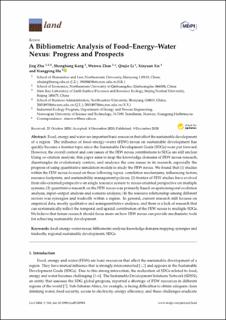| dc.description.abstract | Food, energy and water are important basic resources that affect the sustainable development of a region. The influence of food–energy–water (FEW) nexus on sustainable development has quickly become a frontier topic since the Sustainable Development Goals (SDGs) were put forward. However, the overall context and core issues of the FEW nexus contributions to SDGs are still unclear. Using co-citation analysis, this paper aims to map the knowledge domains of FEW nexus research, disentangles its evolutionary context, and analyzes the core issues in its research, especially the progress of using quantitative simulation models to study the FEW nexus. We found that (1) studies within the FEW nexus focused on these following topics: correlation mechanisms, influencing factors, resource footprints, and sustainability management policies; (2) frontier of FEW studies have evolved from silo-oriented perspective on single resource system to nexus-oriented perspective on multiple systems; (3) quantitative research on the FEW nexus was primarily based on spatiotemporal evolution analysis, input–output analysis and scenario analysis; (4) the resource relationship among different sectors was synergies and tradeoffs within a region. In general, current research still focuses on empirical data, mostly qualitative and semiquantitative analyses, and there is a lack of research that can systematically reflect the temporal and spatial contribution of the FEW nexus to multiple SDGs. We believe that future research should focus more on how FEW nexus can provide mechanistic tools for achieving sustainable development. | en_US |

